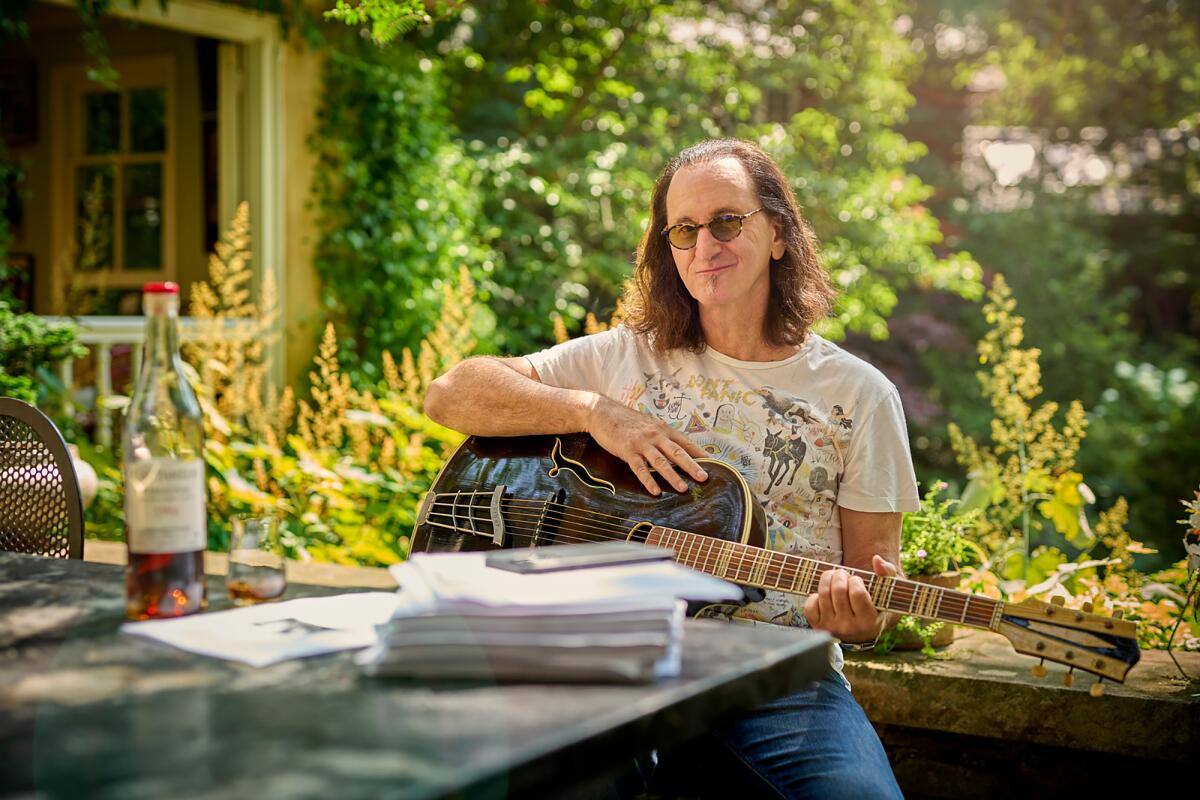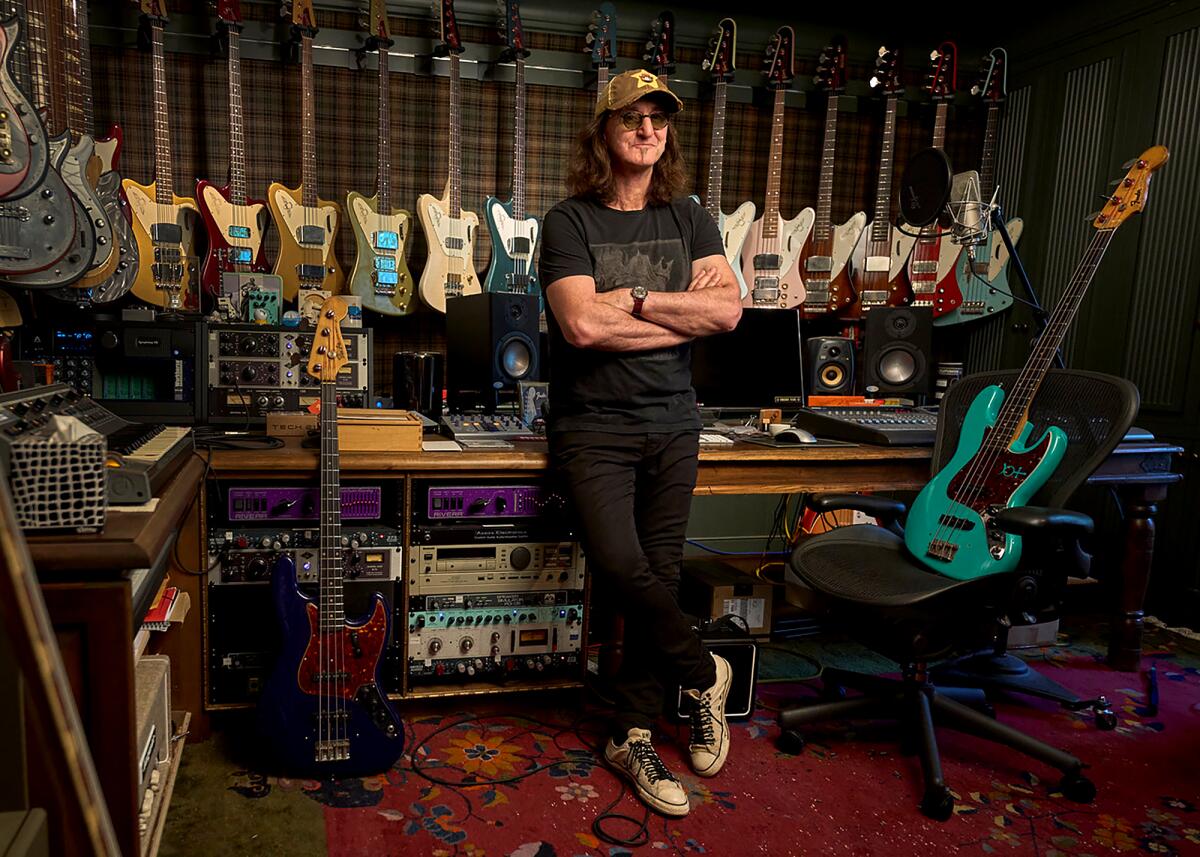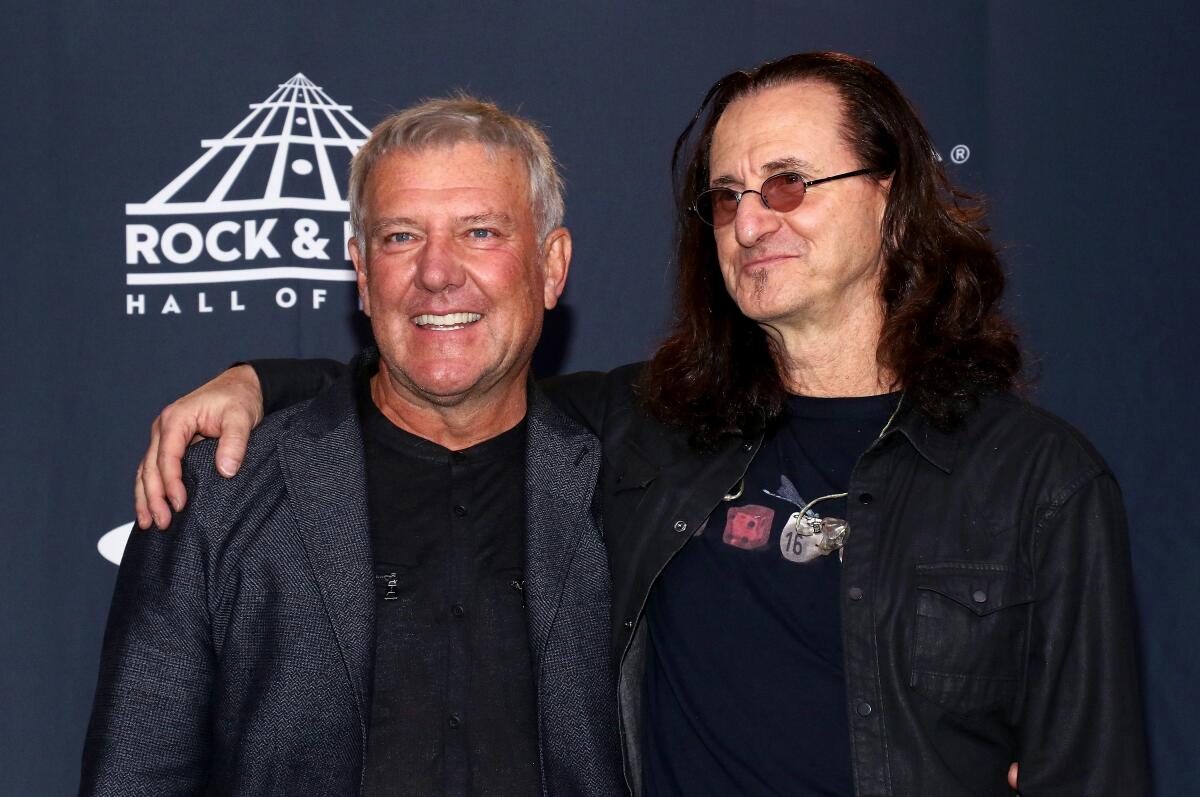Rush’s Geddy Lee: ‘I had a childhood full of stories about death and murder’

“You probably know me as Geddy Lee, but my birthname was Gershon Eliezer Weinrib after my maternal grandfather who was murdered in the Holocaust.” Why did you choose that as the first sentence in your book?
It explains me. How can you read a book about what makes me tick without understanding the legacy I inherited from my parents? Any time I was asked to write a memoir, I said, “Come back when I’m really old.” I fell into writing it for a number of reasons. One was watching my mom slowly disappear into dementia. I was driven by a fear of forgetting things, the way my mother was forgetting. Once I got into it, I found it cathartic, and a helpful way of sorting out things from my past.
I keep a lot of things. I call myself a collector, but it’s a disguise for being a hoarder. I kept every hotel room key from the first Rush tour. “I might never be in Indiana again!” [laughs] I thought I was on thin ice as a touring musician, and these would be the keepsakes I’d look at later, when I was working in a delicatessen.
The closer I got to writing about the present day, the more difficult it became.
Why?
Because I could remember too much. Playing long tours in the 2000s just seemed less fun to talk about than the early days of riding across the United States in a station wagon with a few other guys, smoking joints all the time.
Were the later tours much less wild?
People asked, “During intermission, is everybody backstage doing lines?” No, Alex is using the washroom, Neil is having a smoke and I’m checking box scores for my fantasy baseball team. [laughs] That’s how we roll!
I’ve known a few families of Holocaust survivors. They seem to divide into two categories: the family that never talks about it, and the family that never stops talking about it.
We had both. My dad didn’t talk about it, my mother did. Her stories terrified me, and she didn’t seem to think there was anything wrong with that. I don’t know if she was oblivious to possible psychological harm, or whether she wanted us to grow up realizing that everyone wants to kill us. [laughs]
I would never tell stories like that to my children. The book is partly for them, because there are details they haven’t been privy to. Also, considering the state of the universe right now, where it’s so easy to deny that the Holocaust happened, it’s not a terrible thing to reinforce that it did.
Your father died when you were 12, which was another form of family trauma. In the book, you say the trauma came out in your singing voice.
My friend Ben Mink is also a child of Holocaust survivors. When we jammed, if he played a wild solo, he would say, “That’s my mother yelling at me to clean up my room.” [laughs] I realized later in life that I was channeling inner angst in my well-described screeches.
The book has a story that isn’t well known — early on, the other guys kicked you out of Rush.
It was fun for me to tell that story. I confronted Alex, for the first time. I asked what his role was. He said, “Uhh, I was such a quiet guy, Ged. I just went with the flow.” He took no responsibility for it.
When I was really young, I didn’t have a ton of friends, and I spent a lot of time in my own head. I felt like a nerd. After my dad died, I spent almost a year grieving in the Jewish tradition, going to synagogue three times a day. When I was released from that grief, I went nuts. I wanted to hear every song I had missed.
I’d had this image of myself as a mousy kid, but as I worked on the book, I was shocked at the things I did. When the guys kicked me out of the band, I started another one in a minute. Those aren’t the actions of a nerd.
I had a childhood full of stories about death and murder. After my dad passed, our home was a very sad place. I wanted to live. Even though I didn’t articulate it this way, I set about living.
You wrote the book during lockdown. Did you have other plans that you had to cancel because of the pandemic?
I’d gone through 3½ difficult years of hiding Neil’s illness and lying to my friends. It was a secret that Alex and I couldn’t talk about. When Neil passed, there was an outpouring, like a dam burst. My wife and I went to New Zealand, on a walking trip. When you walk, you can try to make sense of something. But making sense of death is a fruitless task.
Death is a puzzle that can’t be solved.
Well said. After that trip, Alex and I kept threatening to make music together, but he got COVID [in March 2020] and had to be hospitalized. He was in isolation, with a trach tube down his throat. Hospitals were closed to the public. His wife said goodbye to him at the front door.
Neil died in 2020. A couple of months later, Alex was fighting for his life. And your mom died in 2021. Those were two rough years.
Yes, it was a fiesta of grief. [laughs]
Sure. I can imagine her reaction: “[Polish accent] Even if it’s true, vy are you telling people that?” Once she saw me as a success, we had a wonderful relationship. I felt bad for my siblings, because her apartment was wall-to-wall Rush.
My mother used to say, “Nice Jewish boys don’t drink beer.” She knew about some of my teenage antics, because when she came home from work, my grandmother would complain about “the little Hitlers in the basement,” who were making a mess and smoking cigarettes.

It probably wasn’t smart, but it was like a fatal attraction. I was entranced when Hugh Syme played a little ARP synthesizer in the opening of [the 1976 album] “2112.” I needed to see if it was a way to bring more music to our music. We were all hungry for new ideas, although Alex was giving me odd glances. [laughs] His guitar was the one form of instrumental melody, and now we had another. At one point, we even talked about adding a fourth member to play keyboards.
“Signals” lost us some fans. We went down that road until we got to a point where Alex was exceedingly unhappy and we were drowning in technology. And God, did I want to stop doing three jobs at once and just play my ax, man.
[laughs] That song is very Police-like. Neil loved Stewart Copeland’s playing and the guitar sounds like Andy Summers. We couldn’t sit still. Look at [the 1991 album] “Roll the Bones” and the ridiculous controversy it caused by having a rap section. Some rock stations said, “We don’t play rap.” Have you heard real rap? Do I look like a rapper?
That’s too highbrow for me. Those reviews are funny. At the time, they were ouch funny. “The damned, howling in Hades” has always been my favorite. Our reviews were brutal … but only for the first 30 years. (laughs) We got inured to it.
We got comfort from her manifesto at a time when we were staring into an abyss and thought we might not survive. I don’t regret it, because it helped save us. I reserve the right to learn from what I’ve done in the past, and not agree with my younger self.
I hear what you’re saying, and I don’t want any association with that type of thinking, because that’s fascism. I guarantee you Trump has never read Ayn Rand.
The first manuscript I delivered was 1,200 pages, so I wanted to call it “Every Boring Detail.”.
Do you miss Rush?
Oh f— yeah, enormously. It was hard for me when Neil announced he was going to retire, which is a word I refused to hear, la la la. Do I miss the adulation? No. But I miss the sound of the crowd a little bit. When I go see my friends on tour, I am jealous. They’re still enjoying it.
It’s been eight years since the last Rush gig. To start the whole thing up again takes an incredible amount of koyech [Yiddish for strength]. Would I do it again? [pauses] It’s possible. Will I do something else musically? It’s possible. Now that I’ve turned myself into a farkakte [Yiddish for lousy] writer, I have to get this out of the way first.

Near the end of the book, you say the idea of you not playing music again “is just plain wrong.” Are you closer now to doing something?
I’m emotionally closer, yes. I found two lost demos of songs I wrote for [the 2000 solo album] “My Favourite Headache,” and I’m putting them in my audiobook. A friend of mine added a drum part to the demos and it was good for me to be working with music again. It was a soft landing.
Could there ever be another Rush show?
There could be a show that paid tribute to the songs of Rush. I would never say there will never be another Rush show. We get approached all the time.
Do drummers ever say, “If you continue without Neil, I’m available”?
Again, all the time. At the Taylor Hawkins tribute concert [in September 2022], Alex and I played with Dave Grohl and a bunch of other drummers. Neil would have loved it. I know he was looking down at us — or looking up at us [laughs] — and thinking, F—, that would have been fun.
